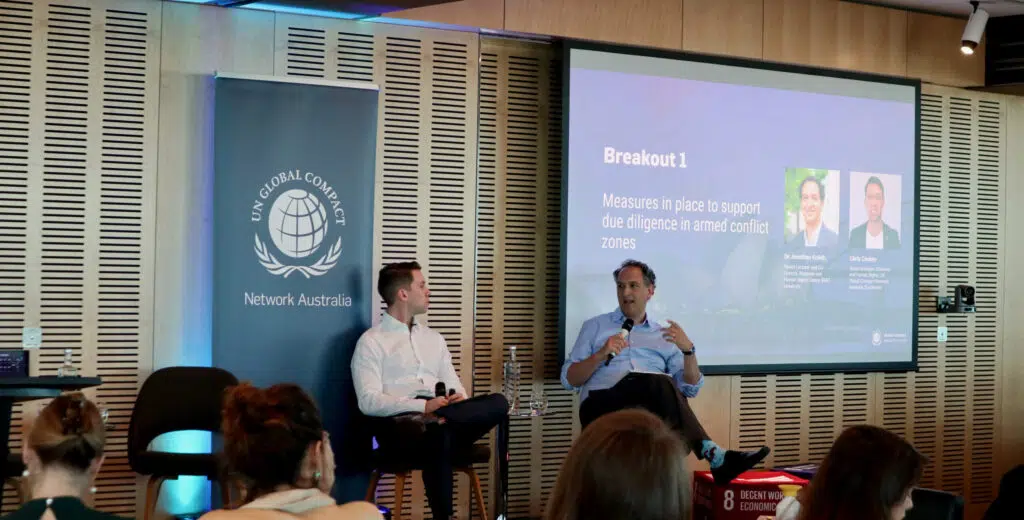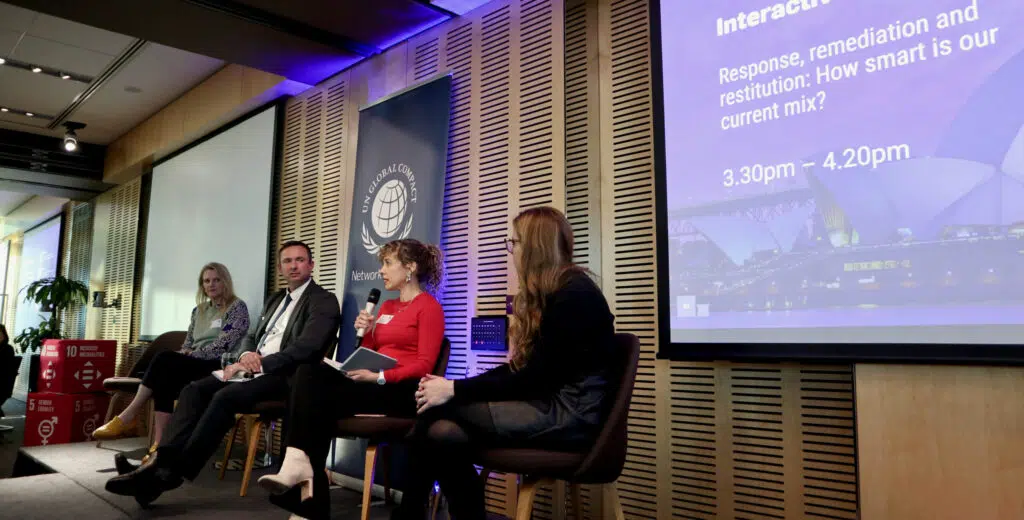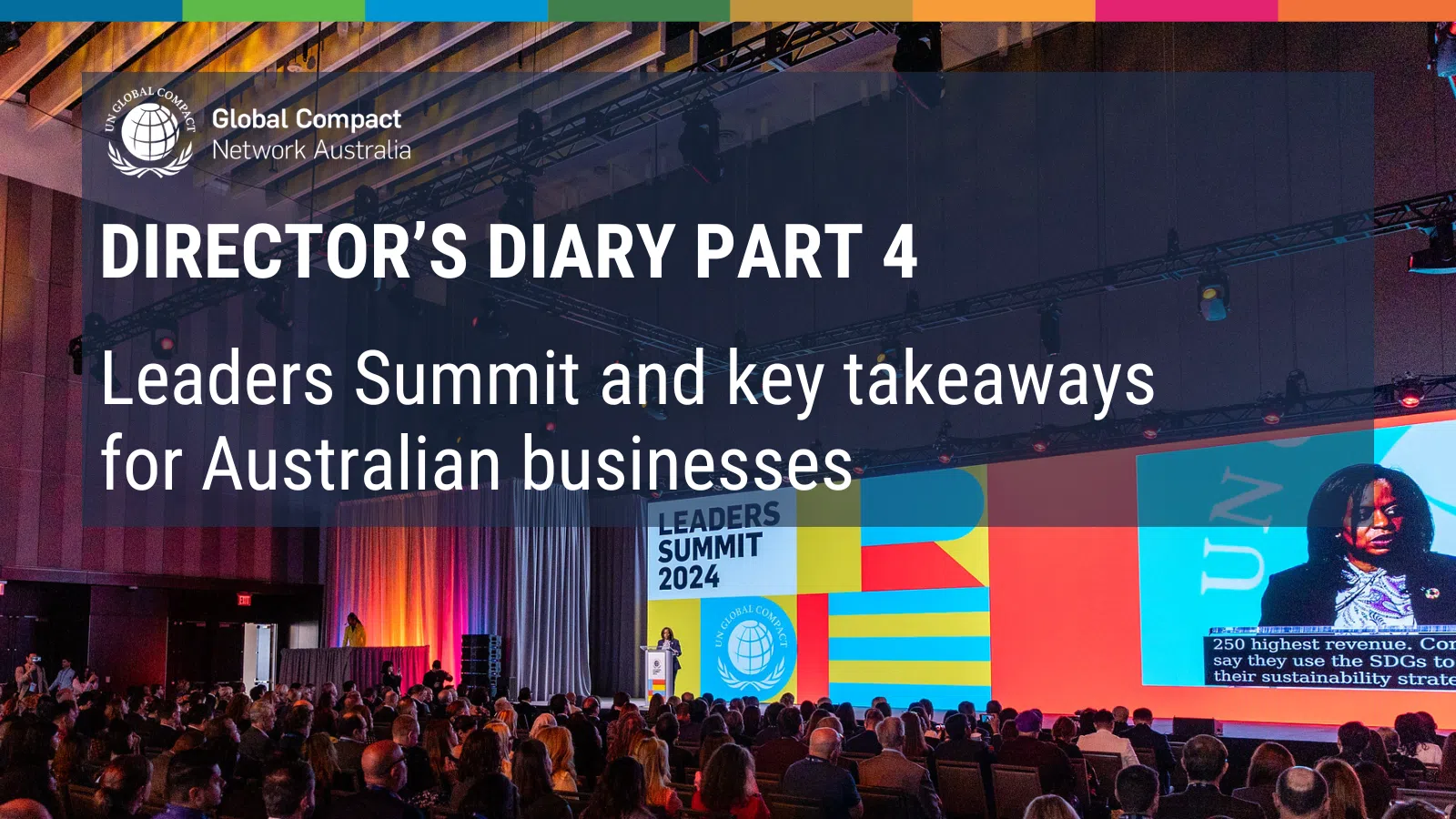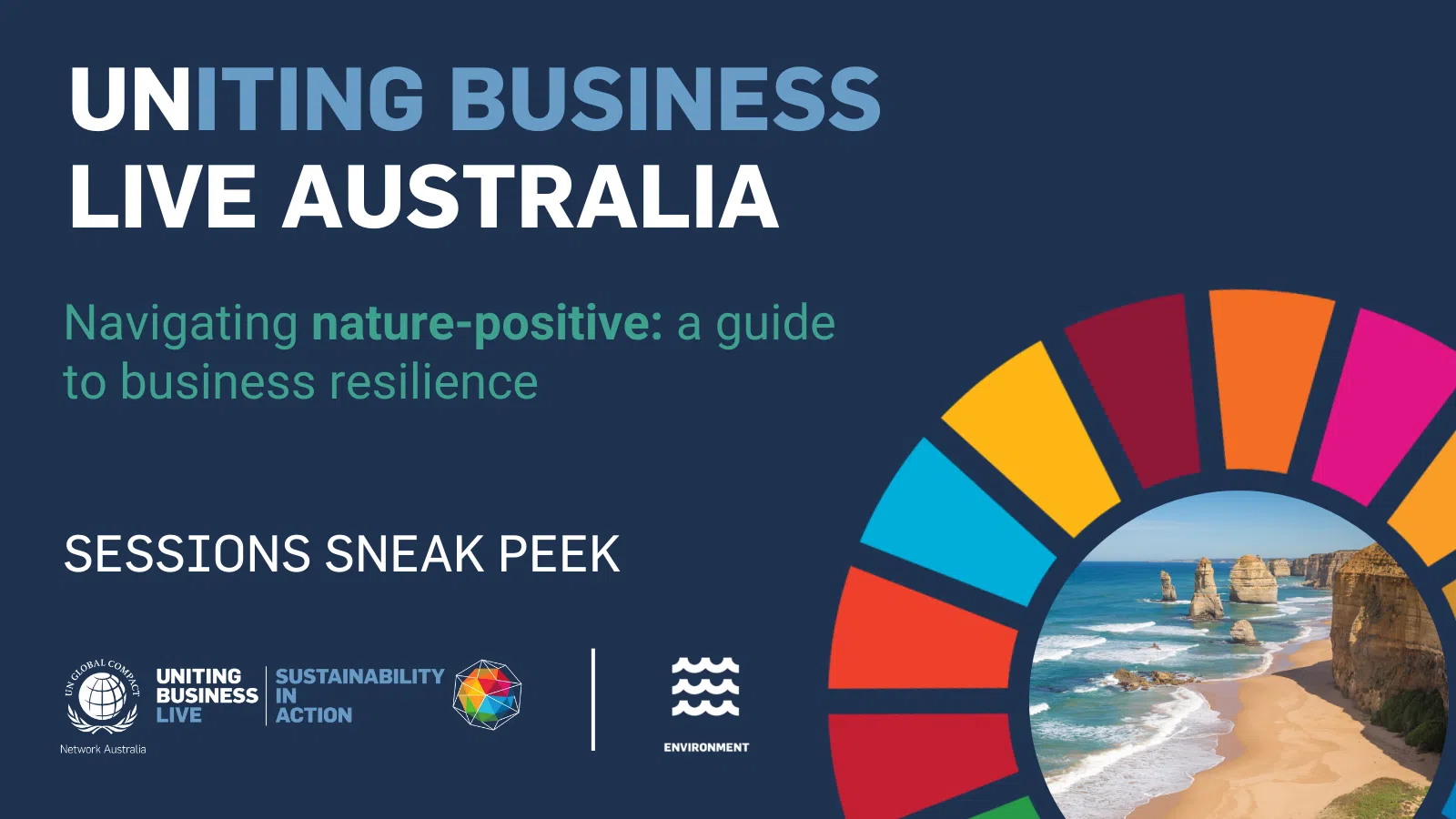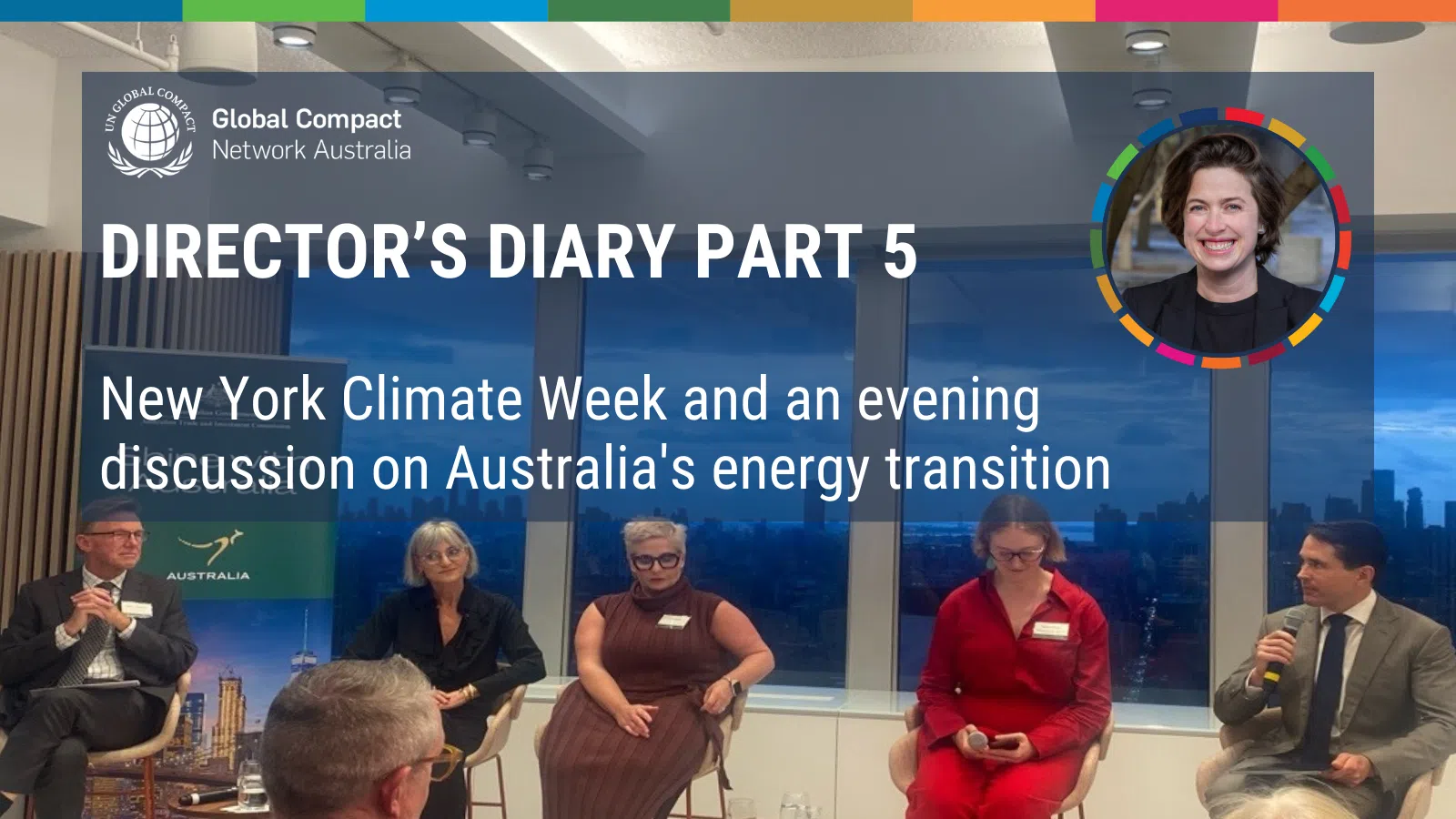
Blogs, Business & Human Rights, Events, Featured
BLOG | Let’s talk about the ‘smart mix of measures’ here in Australia: Highlights from the 2024 Australian Dialogue on Business and Human Rights
Julia Bourke | July 26, 2024
Key Points:
- In June 2024, the UN Global Compact Network Australia (UNGCNA) convened 150 human rights practitioners, government, civil society, academia and investor representatives to discuss advancing the business and human rights agenda in Australia
- The theme of the 2024 Dialogue was ‘Let’s talk about the ‘smart mix of measures’ here in Australia’: attendees discussed the existing regulatory framework in Australia and considered what the ideal smart mix of measures could be in Australia to foster business respect for human rights
- Panellists unpacked key business and human rights issues for businesses in 2024 – such as conducting human rights due diligence in high-risk settings, the impact of the Respect@Work measures on gender equality in Australia and current avenues for response, remediation and restitution. This blog contains our key insights from the 2024 Dialogue
Blog
On 18 June 2024, the UN Global Compact Network Australia convened over 150 representatives from business, civil society, investor groups, government, and other stakeholders to discuss the ‘smart mix of measures’ in Australia. Throughout the dialogue, attendees discussed progress on integrating the UN Guiding Principles on Business and Human Rights (UNGPs) within Australia and explored shared challenges in achieving the ideal ‘smart mix of measures’– such as the provision of an effective remedy, engagement between rights-holders, civil society and business and the nature of the regulatory framework here in Australia.

Fernanda Hopenhaym, Keynote Speaker, addressing attendees of the 2024 Australian Dialogue on Business and Human Rights.
There is no one single solution or actions that governments and businesses can implement to fix the problems and the challenges that we have: Attendees noted the importance of a ‘smart mix of measures’ as described in the UNGPs is integral in driving responsible business in Australia, including a mix of policies, laws and guidance that serve to regulate and support corporate respect for human rights. Attendees explored how the ‘smart mix’ is exhibited in other jurisdictions outside of Australia and how different mandatory and voluntary components act to enable and encourage businesses to respect human rights overseas.
Chris Caskey, Senior Manager, Business and Human Rights at UNGNCA, and Vanessa Zimmerman, CEO, Pillar Two, facilitating a workshop at the 2024 Australian Dialogue on Business and Human Rights.
Strengthened collaboration will be integral in improving the ‘smart mix’ in Australia: Attendees discussed key impacts of the current mix in Australia as well as key opportunities to improve the current regulatory set up. There was consensus among attendees around the need for strengthened collaboration across stakeholder groups to enable the sharing of best practices, leveraging of diverse perspectives and collective action on human rights challenges including systemic issues.
Chris Caskey, Senior Manager, Business and Human Rights at UNGNCA, and Jonathan Kolieb, Senior Lecturer in Law, RMIT University, participating in a breakout discussion at the 2024 Australian Dialogue on Business and Human Rights.
Mechanisms of support for businesses conducting due diligence in high-risk settings for an integral part of Australia’s smart mix: Attendees outlined the complexities that companies face in conducting due diligence in high-risk settings with a focus on operating overseas and operating in armed conflict zones. Attendees noted various tools and supports in place that businesses can utilise when operating in high-risk settings to ensure that businesses can continue to operate responsibility and abide by the UNGPs.
Professor Surya Deva, UN Special Rapporteur on the Right to Development; Professor, Macquarie Law School; Director, Centre for Environmental Law, Macquarie University, addresses the audience during a debate on the Australian government’s approach to responsible business at the 2024 Australian Dialogue on Business and Human Rights. Professor Deva is joined by Sebastian Conley (left), Amelia Bruce (centre left), Professor Justine Nolan (centre) and Dr Ebony Birchall (centre right).
The implications of Australia’s current mix of measures are both positive and negative: At the 2024 Dialogue, the UN Global Compact Network Australia hosted an expert debate focussed on the Australian government’s approach to responsible business. Debaters highlighted a range of arguments on both the affirmative and negative side – overall attendees agree that there are strengths within the Australian government’s approach to responsible business as well as lessons that can be learned from other jurisdictions to improve Australia’s ‘smart mix’ such as mandatory human rights due diligence legislation in Europe.
Dr Samone McCurdy, Executive Manager, Capacity Building, Workplace Gender Equality Agency, addressing attendees at the 2024 Australian Dialogue on Business and Human Rights. Dr McCurdy is joined by Dr Meredith Nash (centre) and Fiona Reynolds (right).
New reforms and legislation are driving positive change for Australian companies regarding gender equality: Attendees explored the impact that both the Respect@Work reforms and the updated Workplace Gender Equality Agency (WGEA) reporting have had on company performance on gender equality within corporate Australia. Attendees were able to find out about steps that companies are taking to eliminate sexual harassment and discrimination in the workplace, and to reduce the pay gap and promote representation in company leadership.
Lauren Zanetti, Member, Governance and Advisory Board, Australian National Contact Point (AusNCP) participating in a panel discussion at the 2024 Australian Dialogue on Business and Human Rights. Ms Zanetti is joined by Rachel Hold (left), Luke Perrit (centre left) and Vanessa Zimmerman (right).
Access to remedy and remediation pathways is an essential part of a ‘smart mix of measures’: The 2024 Dialogue featured discussions around how smart is Australia’s current mix of response, remediation and restitution. Attendees were able to obtain and understanding of various remediation pathways in place within Australia by hearing from three key business accountability pathways, including the Australian Human Rights Commission, the Australian Federal Police and the Australian National Contact Point for Responsible Business Conduct.
The UN Global Compact Network Australia is proud to deliver Australia’s annual multi-sector and multi-stakeholder forum dedicated to advancing the business and human rights agenda. We would like to extend our thanks to all speakers and attendees for their attendance and engagement. The 2024 Dialogue was made possible by the kind support of KPMG Australia, Qantas and Pillar Two.

